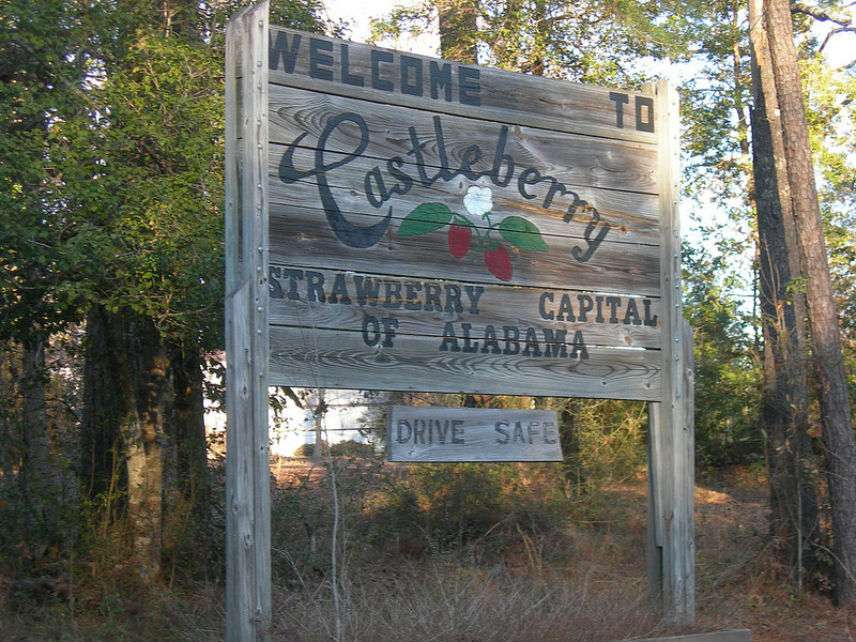Small Alabama Town Hired Cops, Judge, Prosecutor, Set Up Speed/Asset Forfeiture Trap
Motorists have found alternate routes, and now the townspeople may lose their police force.

The mayor of Castleberry, Alabama, told residents at a recent town hall meeting their three-officer police department may have to shut down because of a steep drop in traffic ticket revenue.
Mayor Henry Kirksey blamed the drop in revenue on the bad publicity from coverage of a seven-plaintiff lawsuit alleging officers in the town of 550 people set up speed traps and made other spurious stops, charging $500 to recover impounded automobiles if drugs were present and using the state's asset forfeiture law to confiscate cash and belongings when available, as an October article in Al.com reported.
J.B. Jackson, the mayor whose idea of stops and confiscation paid for the department, a municipal court judge and a prosecutor, was ousted in an election last year. His former police chief, Tracy Hawsey, resigned in February after the suit was filed.
Route 31, a local connecting route for I-65 between Mobile and Montgomery, cuts through Castleberry.
Richard Nix, lead attorney on the lawsuit, estimates more than 100 people may have been ensnared. Nix says the belongings and the alleged drugs seized in his plaintiffs' cases have not been accounted for. His clients claim $5,500 in cash was taken from them, and Nix insists Hawsey did not follow the minimal procedural requirements in place for asset forfeiture, like explaining to the county attorney why you're seizing cash and property.
One plaintiff said Castleberry police in military-style camo pulled him over as he was pulling out of a driveway last October, impounding his car and seizing $1,750. According to the lawsuit and court documents reviewed by Al.com, he wasn't so much as charged with a traffic offense.
Another plaintiff alleges police confiscated $3,800 from her vehicle, claiming they were "proceeds from an illegal drug dealing or activity," in June 2016, but did not file a civil forfeiture request. Her car remains impounded.
Jackson and Hawsey set up the department in 2009. "We didn't have much so Hawsey come to me and said 'There is a lot of crime in this town and a lot of drugs coming through this town,'" Jackson told AL.com. "So he said why don't we set up a court system to get some money coming in."
At one point Castleberry had 5 police officers—more than 5 times the national per capita average. "We hired our own DA and own judge," Jackson continued. "The revenues started to grow and we built out the police department."
Nix said Hawsey, gloated on Facebook about what was happening. According to Nix, he posted photos of people he had arrested as well as videos purportedly showing him joking around and discussing the arrests.
The brazenness makes Jackson and Hawsey's effort (Jackson doesn't deny the department set up speed traps to generate revenue) a perfect example of "policing for profit"—how municipalities turn police departments into revenue generators rather than agencies intended to improve public safety. Alabama law permits police departments to keep 100 percent of the proceeds of asset forfeiture and has no reporting requirement.
When word of the lawsuit got around, people began avoiding Castleberry, which brought on a fiscal crisis. The town found itself with $60,000 in unpaid bills and a "six figure debt," Kirksey said.
"One thing he told me," Kirksey said of the current Police Chief Troy Stalley, "was that it was pretty easy to write 10-20 tickets a day, but once the publicity come out in the newspaper he told me sometimes it's hard to get five a day."
Stalley denies his department has any speed traps any more. "There are between 10 to 20 traffic stops a day, if that many," Stalley told the Brewton Standard. "When you look at the math, that's less than 1 percent." He also insisted the town now only gets $12 per speeding ticket.
Which explains why Kirksey wants to give up on the police department. Residents are split about whether or not to keep it going. At the town hall meeting, the council voted 3-2 to keep running the department on a "limited basis."
Kirksey didn't hide his opinion of the council's decision. "We cannot go on like this," he said, "and if y'all want to bankrupt the city by continuing to have a police department that's fine by me."


Show Comments (30)